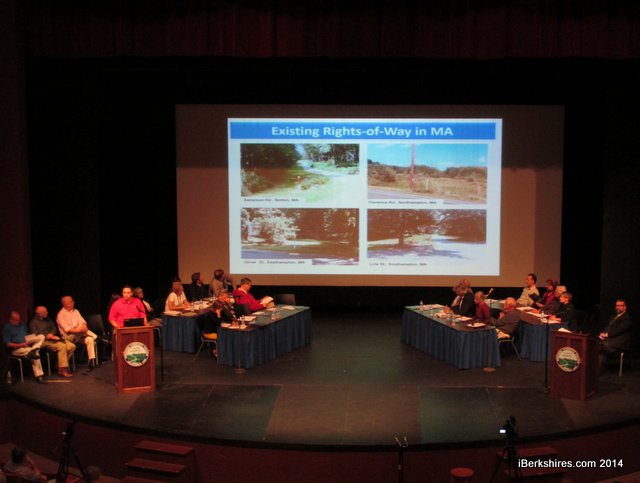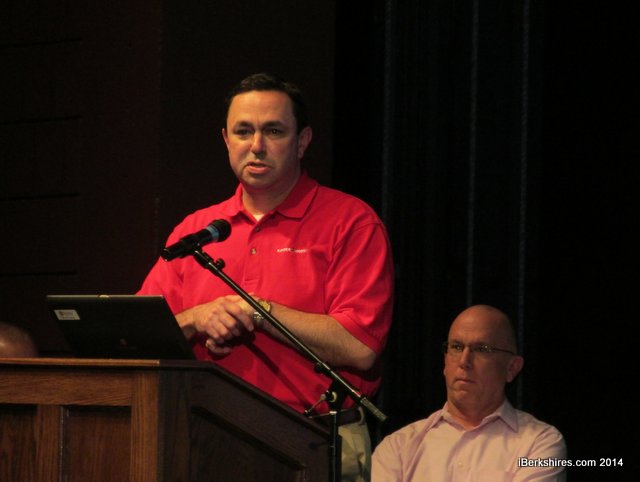Pipeline Debate Hinges On Energy Needs, DemandsBy Andy McKeever, iBerkshires Staff
03:55AM / Friday, September 19, 2014 | |
 Berkshire Regional Planning Commission held a meeting on Thursday inviting both Kinder Morgan and the Conservation Law Foundation to present their sides of the argument. Berkshire Regional Planning Commission held a meeting on Thursday inviting both Kinder Morgan and the Conservation Law Foundation to present their sides of the argument. |
PITTSFIELD, Mass. — Kinder Morgan is proposing a new natural gas pipeline through the Berkshires to help deal with an "energy crisis."
The company's Northeast Energy Direct project aims to build a 36-inch transmission line from the Marcellus Shale region of New York through Massachusetts and up to Maine.
Allen Fore, vice president of public affairs, said the proposal is a direct response to requests for more gas from both policy makers and customers.
"It really isn't Kinder Morgan saying it. It is the policymakers," Fore said on Thursday night at a presentation for the Berkshire Regional Planning Commission. "There is an urgent need for energy infrastructure."
The need centers around electricity and the 52 percent of the electricity generators that use natural gas. But in the winters, when natural gas is peaking in residential and business usage for heating systems, that leaves less for electrical generators. The current transmission lines are at capacity.
"The only way to provide more natural gas is more infrastructure," Fore said. "This winter, natural gas prices will go up again."
Kinder Morgan says billions of dollars were paid extra by New England homeowners and businesses because of the premium cost. The new pipeline adds to the supply, allowing electric generators to pay at a lower rate instead of at the current premium. The company already has dozens of distributors along the line — including Berkshire Gas — saying they want more gas.
The need for infrastructure was supported by all of the New England governors, including Deval Patrick. However, in recent statements, Patrick has seemingly moved off from that position now that pipeline projects have been proposed. The change in stance is much to the chagrin of Lenox Board of Selectman Chairman Channing Gibson, who is calling on Patrick to make his opinions clear.
"I think it is important to know why the governor doesn't support this project," Gibson said at his Wednesday night Selectmen's meeting, gaining approval from the town board to write Patrick asking why his position changed.
Lenox is fiercely opposed to the project, which calls for the pipeline to go through its watershed — the only supply for residential drinking water — as well as Kennedy Park. Gibson is writing the federal delegation asking for them to insert themselves into the permitting process and fight the plan.
"It is easy to make a statement, it is another thing to take action," he said.
For Lenox, the construction and environmental disruption has a direct economic impact. Lenox's largest economic sector is tourism. Couple the pipeline construction with the Rest of the River cleanup, and the Selectmen are concerned about the town having a reputation as somewhere people wouldn't want to visit because of construction work.
Gibson doesn't see the benefits of having the pipeline cut through his town and says he doesn't trust Kinder Morgan's claims. But ultimately, the plan to cut through the watershed has them worried about public safety.
Shanna Cleveland from the Conservation Law Foundation says while natural gas has more demand and lower prices now, she doesn't want the company to "overbuild." As New England states have tightened up their environmental policies, particularly with greenhouse gases, it has led to coal and oil producers going out of business.
"We have seen this retirement of coal and oil facilities and an increase in electric power plants that runs on natural gas," Cleveland said.
She agrees that during the winter there is a shortage. But, she explained those are "coincidental peaks" caused because local distributors have agreements to always have gas. The electric companies have interruptible agreements, meaning the gas company can stop the flow at any point. This leads to the local distribution companies selling any excess to the electric producer at a higher rate.
Cleveland says there are many things the states can do to eliminate that need — policy-wise, conservation-wise and through renewable energies. And in the future greenhouse gas reduction will continue, setting sights on natural gas.
 Allen Fore says Kinder Morgan's plan to address the energy problem came from demands from customers and policy makers. Allen Fore says Kinder Morgan's plan to address the energy problem came from demands from customers and policy makers. |
"Now that the coal plants haven't been running as often, the No. 1 emitter of greenhouse gases is natural gas," Cleveland said.
In Pittsfield, Mayor Daniel Bianchi is trying to put more of an emphasis on modern manufacturing in the city's economic picture. He says decreasing electricity costs would help business growth.
"We are three or four times more expensive in New England compared to even New York state, which is only 40 miles away. The plant making the same things in New York state will be more competitive than plants in Massachusetts and we can't afford to lose jobs," Bianchi said in an interview recently.
Bianchi said it is great that the state has more and more renewable energy sources, but he questions if and when the state could offer competitive utility rates. Many manufacturers are high energy users, so the rates become an important piece to the economic puzzle for location.
Meanwhile, he says the pipeline wouldn't be adding any additional hazard because most of the gas here now is the same.
"Most of the gas we are burning up here in New England comes from fracked sources already," Bianchi said.
Cleveland, too, admits that currently there is a "gap" between the energy needs currently and the project growth of renewable sources to fill those needs.
She believes, however, that the answer is in liquid natural gas. She says New England could do a lot more with the liquid natural gas infrastructure, shipping and storage. She said LNG companies are interested in supplying extra for the winters to offset those peaks.
"LNG is a short-term solution," Cleveland said.
LNG can hold off the demand for six years, she said, and will give the region more time to build out the renewable sources, ramp up efficiency and further align the energy policies with the utilities.
Kinder Morgan's project has just entered the permitting phase and would be expected to be completed in 2018, providing enough natural gas for years to come.
| 
 MEMBER SIGN IN
MEMBER SIGN IN
 MEMBER SIGN IN
MEMBER SIGN IN